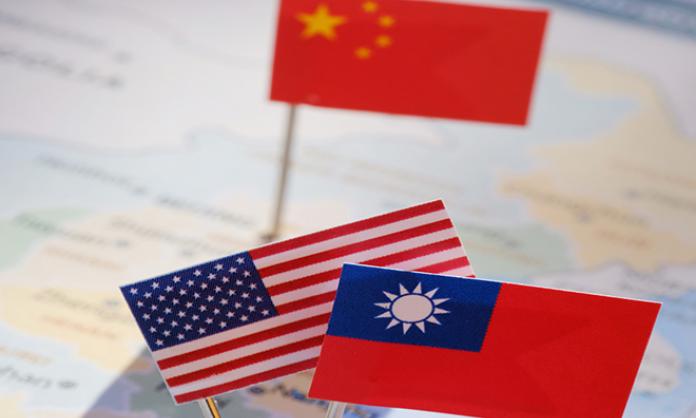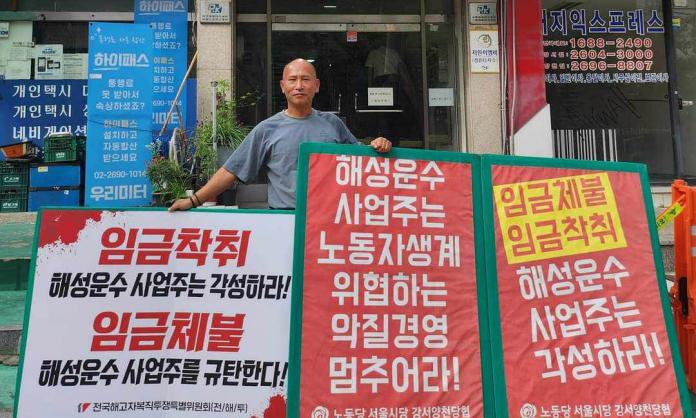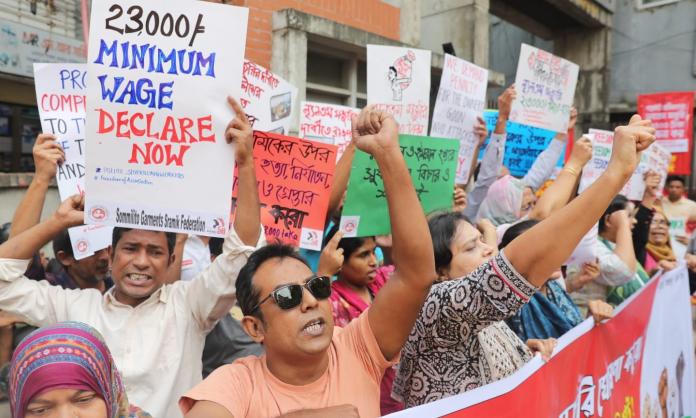The drums of war are beating faster. The media rhetoric increasingly emphasises the urgency of boosting Australia’s military strength, strengthening ties with the US and shoring up regional alliances in order to stand up to a rising China.
The recent speech of Chinese ambassador Xiao Qian at the National Press Club in Canberra, during which he reiterated Beijing’s longstanding claim to Taiwan, provoked a flurry of hand-wringing about the threat posed by China. It is becoming firmly established in both the media and the military and political establishments that a war, or at the very least a major showdown, is now inevitable between the US and China, and that Australia is set to be part of it.
The immediate focus has been on Taiwan, with the provocative visit of US House of Representatives Speaker Nancy Pelosi intended to reinforce the continuing US imperialist presence in the region. In response, China fired ballistic missiles over the island for the first time, sent military ships and aircraft across the median line of the Taiwan Strait in record numbers, and conducted live-fire drills encircling the island in a rehearsal of a blockade. China also imposed some limited economic sanctions on Taiwan.
At least in the short term, an actual Chinese invasion of Taiwan is probably not on the cards. If nothing else, China does not have enough military ships to ferry sufficient troops across the Taiwan Strait to maintain a prolonged occupation against substantial Taiwanese resistance.
In addition, much of the material and financial advantage of China seizing the highly advanced Taiwanese economy would be lost in a massively destructive war. China would prefer to pressure and coerce Taiwan into line.
The Chinese military exercises were in part aimed at sending a message to the US that China is not to be trifled with, and as intimidation of the Taiwanese people. They were also a statement to a Chinese domestic audience. Chinese President Xi Jinping has staked his position as a powerful leader determined to assert China’s position on the world stage and to challenge US hegemony in East Asia. Seizing Taiwan is emblematic of that project.
But even as Xi sets himself up for a third term as party leader, he is facing serious political problems at home with a slowing Chinese economy and the ongoing impact of COVID-19. Discontent and unemployment are both increasing, youth unemployment reaching 19.3 percent in July. Xi is also facing calls from hardline Chinese nationalists for a much more adventurist military policy towards Taiwan.
On the US side, the Pentagon’s undersecretary for policy, Colin Kahl, stated on 8 August that the US navy would resume its military operations in the Taiwan Strait in the coming weeks. That could prove to be a flashpoint, especially if China continues its drills around the island. And the US is set to step up arms shipments to Taiwan and, at some point, is likely to push to establish a US military base on the island.
The Taiwanese people are in a terrible situation, trapped between two hostile imperialist powers. On the one hand the US hypocritically parades itself as the champion of democracy against authoritarianism, while at the same time courting reactionary regimes like Modi’s India and Marcos’ Philippines. On the other side, China maintains that Taiwan is an integral part of China.
The Taiwanese people have developed their own separate national identity and are no more organically part of China than is the population of Singapore, more than three-quarters of which is of Chinese descent. In a poll this year, only 2 percent of Taiwan’s population identified as Chinese, while almost two-thirds identified as Taiwanese. The brutal Chinese crackdown in Hong Kong has hardly sparked enthusiasm in Taiwan about being part of China.
The Taiwanese have the right to national self-determination and not to be coerced into being part of China, a position that the Chinese Communist Party itself upheld from 1928 to 1943. However, the Taiwanese can place no trust in US imperialism to defend their democratic rights. In a full-scale shooting war between two heavily armed imperial powers, the Taiwanese working class would suffer enormous casualties.
The US ruling class has only ever backed Taiwan or Hong Kong because they serve as useful proxies in its geopolitical contest with China. Support for Taiwan and Hong Kong will go only as far as both are useful for the US. The US long ago abandoned Tibet, for example, despite its pro-independence rhetoric.
At some point the US could simply abandon Taiwan and cut a deal with China. Indeed, the recent Chips Act passed by the US Congress could eventually make it easier for the US to do so, as it would end its dependence on Taiwan for supplies of the most sophisticated microchips.
Nor can Taiwanese workers rely on their own wealthy capitalist class, which has extensive investments in China and at some point could cave in to Beijing’s economic pressure. The only possible way forward is to build a fighting working-class movement that links up with workers in China, Japan, South Korea and throughout the region to challenge all the reactionary ruling classes.
The increasingly aggressive US approach to its Chinese rival, which was initiated under the Obama administration with the “pivot to Asia”, was accelerated under the Trump presidency with the imposition of economic sanctions on China. Biden’s defence of US imperialist interests has been just as aggressive as Trump’s, though with an important shift.
Trump’s go-it-alone, hyper-nationalist, US-first approach alienated important US allies, especially Germany and France. The Democrats under the “liberal” Biden have been determined to bring them back on board and to seek out new allies like India. On this front, Biden has had important successes, corralling the European powers into backing his Ukraine policy and winning NATO support for an anti-China stance.
The US is still far and away the greatest military force on the planet, its current military spending of US$778 billion a year dwarfing that of China, estimated to be US$252 billion. Yet the US is engaging in an ever more intense arms build-up.
To enhance its military capability, the US is also attempting to rebuild its domestic manufacturing industry in key security areas and to lessen its economic engagement with China. Despite all the other bitter conflicts between Republicans and Democrats, this is one area where they are in furious agreement.
The Chips Act bears this out. The act will provide a massive US$70 billion subsidy to US companies to build strategically vital microchips in the US on the proviso that they do not make any new high-tech capacity investments in China. The only criticism the Republicans had of the legislation was that it did not totally prohibit US companies making any form of investment in China.
Any war between the US and China over Taiwan would almost certainly involve Australian forces. General Mark Milley, head of the US Joint Chiefs of Staff, recently told the ABC: “We have similar outlooks and we have similar policies. So I would think that, if something occurred in the future, Australia and the United States would still be shoulder to shoulder”.
Australian governments, both Liberal and Labor, are not simply toadying to the US, as some left nationalists would have it. The Australian capitalist class has long recognised that an alliance with a major imperialist power, first Britain and then the US, is vital for the advancement of Australia’s own imperialist interests. In the current context, that necessitates wholehearted commitment to the US side in any showdown with China.
That is what both the recently established AUKUS alliance between Australia, the UK and the US, and the Quad strategic security dialogue between Australia, India, Japan and the US, are all about. These are not defensive alliances to protect Australia from the nonexistent possibility of a Chinese invasion. They are aggressive moves intended to beat more loudly the drums of war against China and better maintain US imperialist domination of the Indo-Pacific region and with it the strategic interests and profits of Australian capitalists.
The Albanese government has been more guarded in its China-bashing rhetoric than the Morrison government was, and Labor has not openly endorsed Opposition Leader Peter Dutton’s statement that it would be “inconceivable” for Australia not to support the US in the event of a war over Taiwan. But in reality, Labor has exactly the same strategic approach to China as the Liberals and is totally on board with the orientation of the Biden administration.
Labor also fully backs the massive escalation of military spending initiated by the Liberals. While Treasurer Jim Chalmers proclaims the need to rein in the budget deficit, he has already made it abundantly clear that there will be no cuts to Australia’s bloated military spending, which, according to the Parliamentary Budget Office, is set to climb by 68 percent to reach $75.7 billion annually by early next decade. Money for warmongering is sacrosanct, but workers face ongoing cuts to their wages and vital public services.
Taiwan is not the only potential flashpoint. China is the world’s leading exporting nation, and 95 percent of Chinese trade is seaborne, which makes control over the South China Sea of vital strategic importance to both the US and China.
China has been rapidly building up its maritime forces to stamp its authority over these waterways, but the US is just as determined to maintain a powerful presence using the rhetoric of “freedom of navigation” to engage in spying operations and to encircle China.
To back up the US, the Australian military also sends ships and aircraft to the South China Sea. One of the Australian military’s lesser known contributions involves dropping sonobuoys (floating microphones with radio transmitters) to identify the acoustic signatures of Chinese submarines to enable US hunter-killer submarines to attack them at the outbreak of war. A clash between a Chinese aircraft intercepting an Australian aircraft while it’s dropping sonobuoys and then a further escalation could well be on the cards at some point.
Then there is the growing tension over the increased Chinese presence in the Solomons, Papua New Guinea and other islands in the Pacific which the Australian capitalist class has long considered to be its own undisputed territory, which only it is entitled to exploit.
Socialists strongly oppose the current military build-up in the US and Australia, and the increasing Cold War-style rhetoric from our rulers. The US and Australian capitalist classes use China’s threats to Taiwan, the oppression of the Uyghurs and the repression in Hong Kong to inflame hostility to China.
Our rulers claim to be championing democracy against authoritarianism. This is an utterly cynical and hypocritical approach given the US’s own long record of brutal suppression of democratic rights from Iraq to Afghanistan to Vietnam and its longstanding support for Israel’s oppression of the Palestinians.
Socialists oppose an imperialist war between the US and China over control of the South China Sea, Taiwan, the Solomons or any other issue. We stridently oppose any Australian involvement in such a war, a war that could cost many hundreds of thousands of lives if fought with conventional weapons, and untold millions if nuclear weapons were unleashed.











